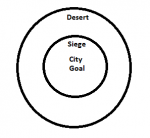I don't see any of your players leaping to support you either. "No evidence" is not the same as "evidence". I also see no one else who was involved in Hussar's game clarifying the views of the other players or the GM.
From my point of the view, here are the basic dynamics of this thread.Because it was directed at Pemerton and not you and you've said considerably worse about others who approached this whole topic from a different perspective than you - glass houses and stones and pots and kettles and such.
I don't care how you are characterizing your argument. Pemerton usually doesn't sound like he's assigning blame in discussions of style but in this particular thread he seems to be doing what he accused others of doing and I pointed it out.
Hussar: I once had this bad play experience - I did this thing (centipede to cross desert) and this other thing (hirelings to get vengeance on grell), and the GM, rather than rolling with it and following my cues, insisted on running through pointless and boring stuff involving Use Rope and Ride checks (for the desert crossing) and job interviews (for the hirelings). I thought that was pretty bad GMing.
Multiple other posters: Actually, your GM was probably a fine GM and you're a bad player for thinking that the GM might have made bad calls in choosing how to adjudicate and resolve your ideas and frame scenes in response to them. Furthermore, if the GM tried to run the sort of game you seem to be calling for than that would be a type of pandering to players that would wreck the game. And still furthermore, you were probably wrecking the game for the other players involved.
Me: WTF? Maybe you don't want to play Hussar's way - after all, he's even talked about his preferred style and how it might be different from yours. But Hussar is talking about a completely coherent and viable way of playing an RPG, which I'm also a big fan of both as player and GM. And I can completely see why Hussar thought his experience was pretty bad. That sort of experience would make (and has made) me quit a game too.




